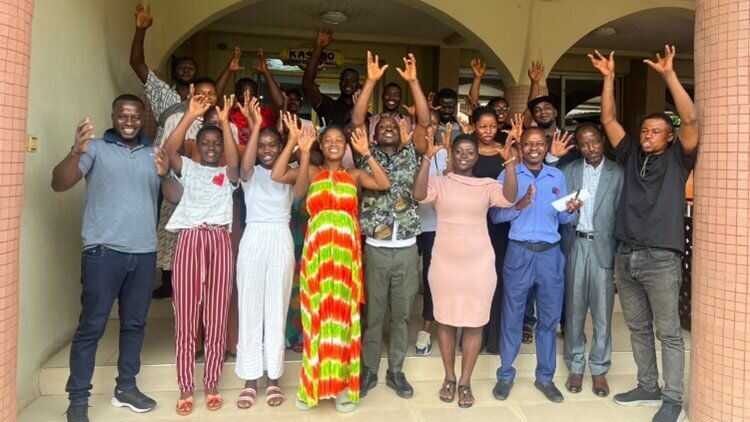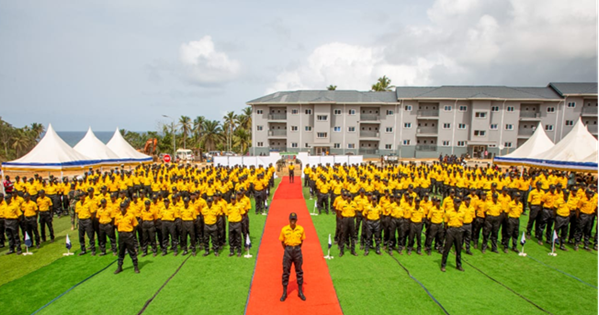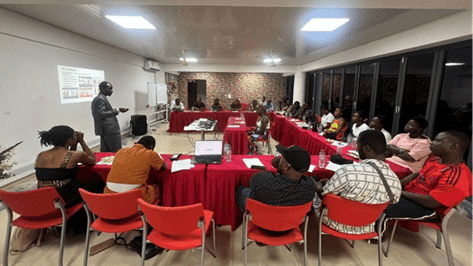VPI Blog: Galamsey and the Blue Water Guards – Addressing Risks of Illegal Mining in Ghana
September 18, 2025 •

Since 2017, a multistakeholder group comprised of extractive companies, representatives from the government and from civil society have been working together in Ghana to identify security and human rights issues in the natural resource sector and support local implementation of the Voluntary Principles on Security and Human Rights (VPSHR). The Fund for Peace, Co-Chair of the Ghana In-Country Working Group (ICWG), shares recent updates of its work in this blog.
Illegal artisanal and small-scale gold mining in Ghana, locally known as galamsey, has affected many areas of life in the country. One of the most alarming consequences is the widespread pollution of rivers and streams, threatening both human health and the livelihoods that depend on clean water. Illegal mining pollutes water bodies through the processing of soil and crushed stones near waterways, where chemicals like mercury and cyanide are used, which ultimately contaminate rivers and streams.
In response to this increasing challenge, the Ghanaian Government, working through the Ministry of Lands and Natural Resources, launched the Blue Water River Guard program in March 2025. This initiative aims to equip 2,000 Ghanaian youth with the necessary skills and knowledge to safeguard the country’s rivers and other water bodies affected by galamsey. The guards will receive training in surveillance, survival swimming, boat handling, and basic combat, as well as in monitoring river health, identifying illegal mining activities, and working collaboratively with local communities and traditional authorities to combat water pollution. At its core, the Blue Water Guards initiative aims to establish a sustainable, community-led surveillance system dedicated to the ongoing protection and restoration of water bodies affected by illegal mining.

The first phase of the program entailed the training of 400 young men and women at the Ghana Navy Riverine Command under the auspices of the Minerals Commission. To complement this training, the Ghana In-Country Working Group conducted a regional training program for 21 water wardens/guards utilizing its Voluntary Principles on Security and Human Rights (VPSHR) curriculum in late May 2025. The training was delivered by Albert Yelyang of WANEP-Ghana and Christopher Nyarko of the Fund for Peace, both co-chairs of the Working Group. The trainees were introduced to the foundational principles and concepts of human rights, gained a comprehensive understanding of the Voluntary Principles, and explored potential human rights and security risks associated with the mining sector. Each topic had a set of carefully designed activities, making the training sessions interactive and hands-on to foster deeper engagement and more effective learning. One trainee noted, “The problem of illegal mining on water bodies and in forest reserves is a complex one but we are committed to resolving it effectively.”

The new recruits also had the opportunity to share their concerns and discuss challenges faced, including limited access to transportation, the lack of uniforms and identity cards for the guards, and weak enforcement of mining laws. The potential dangers faced by the unarmed Blue Water Guards, particularly when encountering armed illegal miners, were also raised. A Minerals Commission representative present at the training clarified that the Guards are not expected to confront miners but are tasked only with monitoring and reporting illegal activities to security forces. Acknowledging the potential safety risks, the representative assured trainees that efforts were underway to minimize harm and coordinate with authorities to protect the Blue Water Guards in the field. Additionally, she noted that the Government is currently procuring the requisite resources, including uniforms and motorbikes, to support and strengthen the operational capacity of the Blue Water Guards.
Overall, the participants, who are already deployed to the areas where they will be working, expressed strong interest in and commitment to the Voluntary Principles on Security and Human Rights, pledging to uphold the principles and apply their newly acquired knowledge in their mission.

The In-Country Working Groups
The Voluntary Principles Initiative (VPI) supports and collaborates with a network of VPI and partner multistakeholder In-Country Working Groups globally. In-Country Working Groups are intended to facilitate more effective country-level implementation of the Voluntary Principles by improving stakeholder coordination and engagement, leading to constructive dialogue. The aim of the working groups is to build on-the-ground capacity to identify local in-country risks and challenges related to security and human rights, and to work to identify collective solutions to those challenges
